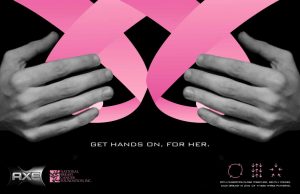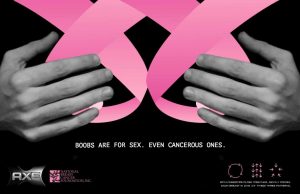Welcome to UBC Blogs. This is your first post. Edit or delete it, then start blogging!
-
Recent Posts
Recent Comments
- Anonymous on Hello world!
Archives
Categories
Welcome to UBC Blogs. This is your first post. Edit or delete it, then start blogging!

My assignment is inspired by this Axe advertisement that aims to draw attention to the company’s support of breast cancer awareness. The ad is problematic in the same way that most of the approaches to breast cancer awareness are problematic; it directs attention to the feminine and sexualized nature of breast and away from the medical condition of breast cancer itself. The theme of advertising around breast cancer awareness is largely pink coloured displays in an attempt to assert the feminine nature of the disease. This ad focuses on the tradition pink ribbon and goes a step further to use their curved shape as mimicked breasts, cradled in the hands of a man. The message about breasts to take away from this ad is that breasts are feminine and for a man’s sexual pleasure. The ad for men’s body wash urges men to “get hands on” (to women’s breasts) in order to help identify and prevent breast cancer, and then provides small diagrams at the bottom of the page showing techniques to feel for irregular lumps. Although these techniques are crucial for women in detecting problematic lumps in their breasts which could be a sign of breast cancer, this ad capitalizes on that to uphold its company’s own agenda of male sexual prowess as a measure of masculinity. It not only reduces women to sexual objects, but also reduces the severity of an illness to the feminization of breasts and ignores the varied experiences of the individuals (of all genders) who have had to live with breast cancer and have it affect their bodies.

In my jammed version of this ad, I changed the words to highlight it’s insensitive nature towards individuals who battle or have battled breast cancer. I highlighted that the ad sexualizes breasts, “even cancerous ones”, for the pleasure of men. I chose to focus on and draw this out from the axe ad because I feel that reducing this illness to the sexualization of breasts and feminization of women, takes away from the stories and identities of people affected by breast cancer. This life threatening illness deserves just as much gravity as any other and ad such as this one that feed into a specific narrative take away from that. Additionally, it is insensitive to women who have lost their breasts as a result of the disease. To uphold breasts as the pillar of femaleness and joke about men’s obsession with them is a perpetuation of our society’s ideals and expectations for beauty. This only further alienates women who may have felt traumatized by the loss of their breasts. Like many other ads in the market, this one adds to the social policing of our bodies and how they are expected to look and behave, but the fact that it is linked to medical illness is a disturbing testament to how media portrays the bodies of women as sexual beings first, and human beings second.